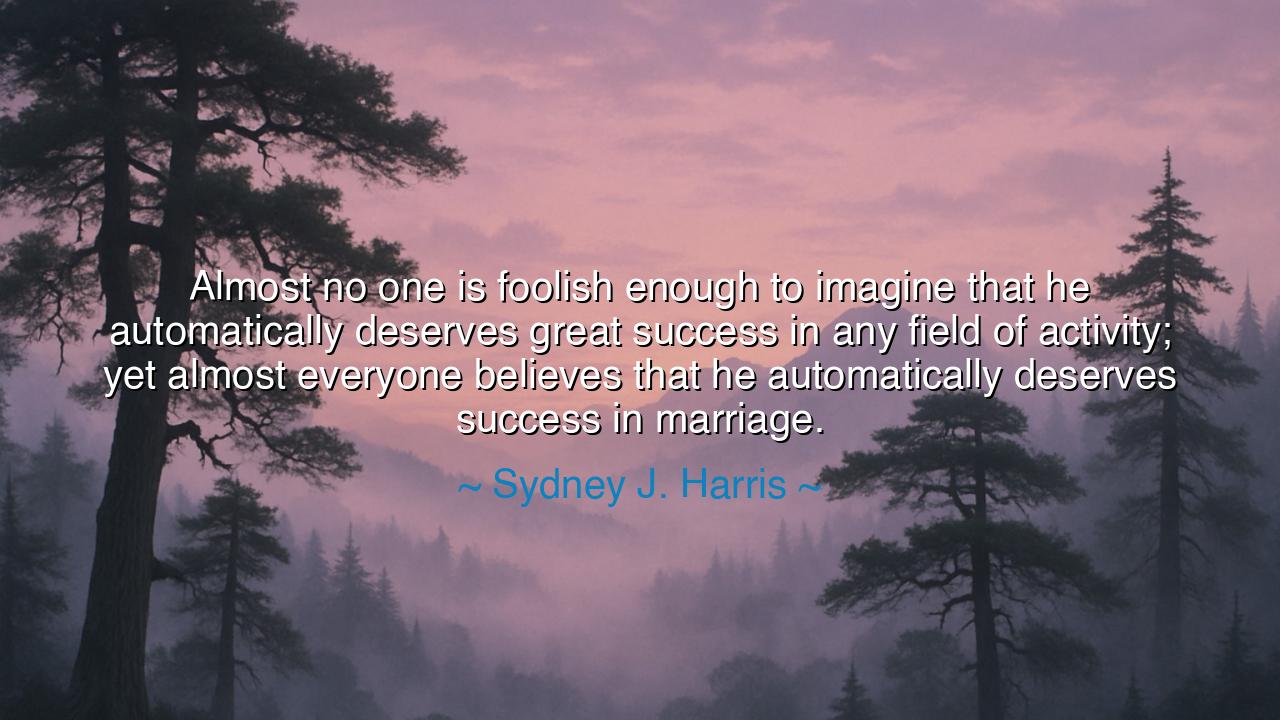
Almost no one is foolish enough to imagine that he automatically
Almost no one is foolish enough to imagine that he automatically deserves great success in any field of activity; yet almost everyone believes that he automatically deserves success in marriage.






The philosopher and essayist Sydney J. Harris, whose pen carried both wit and wisdom, once observed: “Almost no one is foolish enough to imagine that he automatically deserves great success in any field of activity; yet almost everyone believes that he automatically deserves success in marriage.” Beneath this calm and reasonable sentence lies a thunderous truth about human pride and blindness. Harris, who spent his life reflecting on the human condition, speaks here not merely of love, but of the discipline of the heart—the sacred labor that binds two souls in the difficult art of togetherness. His words awaken us to a paradox of our age: we train for every skill except the one that defines our deepest happiness.
For in every other field—art, medicine, war, philosophy, or craftsmanship—men and women understand that mastery requires toil. The musician practices, the scholar studies, the soldier endures hardship, the painter wrestles with color and form. None expects greatness without effort. Yet when it comes to love, to marriage, to the lifelong weaving of two human spirits into one tapestry, people assume it should come naturally, as though affection were wisdom, or desire were endurance. This is the folly Harris unveils: we imagine that because we can love, we can sustain love; because we feel deeply, we can live wisely. But love, like every other art, demands practice, humility, and understanding.
To succeed in marriage, one must cultivate more than feeling. Feelings are the wind that fills the sails, but character is the hand that holds the rudder. The ancient sages knew this well. They taught that love without self-mastery leads not to harmony but to ruin. For when two souls join their destinies, each must learn to restrain pride, to forgive swiftly, to speak with patience, to listen without defense. These are not gifts one receives at birth; they are the fruits of conscious labor. And yet, as Harris laments, most enter the covenant of marriage as they would a garden—expecting blossoms without ever learning to till the soil.
Consider the story of Marcus Aurelius, emperor and philosopher of Rome, who ruled an empire and mastered his passions through years of stoic discipline. Yet in his writings, he confessed the difficulty of human relationships, even within his own household. He wrote, “Begin each day by telling yourself: today I shall meet with the meddling, the ungrateful, the arrogant.” These were not words of cynicism but of wisdom. He prepared his mind daily for the labor of understanding others. And though he wore the crown of the world, he knew that the kingdom of the heart was far harder to govern. So too, those who seek success in marriage must first prepare the inner self—to meet impatience with gentleness, to answer anger with calm, to forgive as quickly as they wish to be forgiven.
Harris’s insight, then, is both a mirror and a challenge. It reflects the tragedy of human expectation: that we demand perfection in love while offering little discipline in return. We expect our partners to read our hearts without words, to heal our wounds without fail, to bear our faults without resentment. Yet we would never expect the farmer to harvest without planting, nor the poet to write without thought. Why, then, do we expect the miracle of love to thrive without care? The answer lies in our forgetfulness—we mistake love’s beauty for its ease. But the truest love, like a precious flame, burns only when tended with devotion.
This is not to say that marriage is drudgery or labor without joy. On the contrary, its labor is sacred, for it refines the soul as fire refines gold. When two people commit not only to feeling but to growth—to learn the other as one studies a language, to serve the other as one tends a garden—then love deepens into something unbreakable. The ancients called this agape, the selfless love that transcends pleasure and endures through storms. Such a love does not merely happen; it is built through patience, humility, and time.
So, my listener, take Harris’s wisdom as a commandment for your own heart. Do not assume you are born knowing how to love well—learn it as you would learn music or philosophy. Study yourself, for self-awareness is the foundation of all union. Listen more than you speak. Apologize more quickly than you accuse. Remember that the success of the heart depends not on chance, but on the daily choice to understand, to forgive, and to nurture.
For in every other craft, the wise apprentice honors the work—and so must you honor love. Enter it not as a conqueror, but as a student. And if you tend it faithfully, if you strive to see your beloved not as a mirror but as a mystery to be cherished, then your marriage will not be built on illusion, but on the living strength of truth. This, then, is Harris’s gift to us: the reminder that the greatest art is not painted on canvas or composed in stone, but lived, day by day, in the quiet heroism of the human heart.






AAdministratorAdministrator
Welcome, honored guests. Please leave a comment, we will respond soon